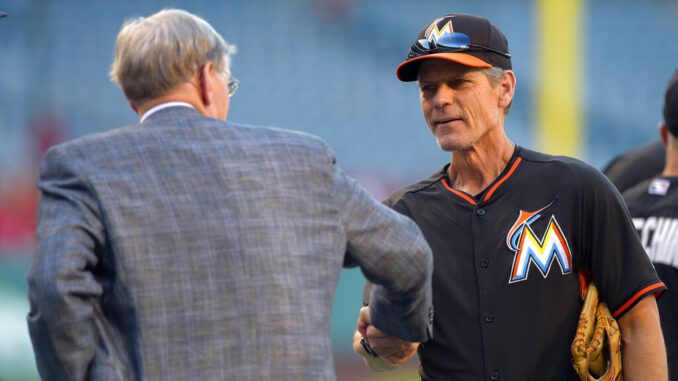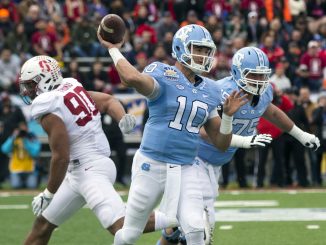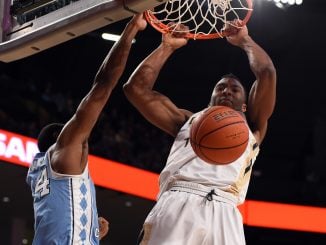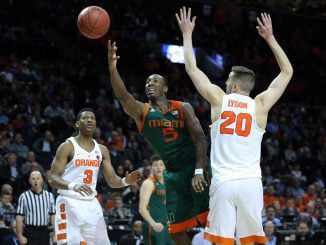
Cancer is something that will touch everyone’s life at some point. For those of us fortunate not to get a diagnosis or a scare, there are friends and relatives who won’t be so fortunate. Shawn Krest has been chosen by the American Cancer Society as one of the Real Men Wear Pink ambassadors for October, which is Breast Cancer Awareness Month. Each day of the month, he’ll be telling a story of how cancer has touched someone on one of the teams we root for. It could be a coach, a player, a retired legend or an arena worker. The disease doesn’t care how successful you are, how much money you have or, as we see in today’s post, whether you gave up risky behavior more than a decade earlier. To join in the fight against breast cancer, you can visit Shawn’s American Cancer Society page.
During his first season with the Durham Bulls, Brett Butler chewed a lot of gum.
He’d tried chewing tobacco in college as a walk-on with the Arizona State baseball team. A coach told him, “Son, if you’re ever going to play in the big leagues you have to learn to chew.’”
He missed practice that day, throwing up.
Three years later in Durham, a retired police officer noticed Butler’s gum habit and tossed him a can of Levi Garrett.
“Why don’t you try this?” he asked.
“Every time I would come out he would throw me a pack of Levi Garrett and I’d take my gum and wrap it around it,” Butler recalled. “I had three or four hits so I was like, OK. One day we ran out and somebody gave me Skoal. I had a dip of Skoal, had a couple of hits, and that was it.”
In 1983, his first season as a regular in the big leagues, he quit after a young kid told him he’d started dipping because of him.
“I haven’t had a dip since,” he said. “I also quit because I didn’t want to get throat cancer, ironically enough.”
Twelve years later, as he was approaching his 2,000th career hit, he had a persistent sore throat. The following March, right before leaving for spring training, he got it checked. Doctors noticed one of his tonsils was swollen. They first tried treating it with antibiotics. When that didn’t work, they recommended removing it.
Butler planned to put off the surgery until after the 1996 season, which was about to begin. He made it two months before his wife traveled from their home in Atlanta to visit him in Los Angeles.
“When I saw Brett’s throat,” she said, “I pitched a fit. He looked bad, tired. He said, ‘Maybe I’ll wait until the All-Star break.’ I said, ‘That’s foolish.’ ”
They decided to go ahead with the tonsillectomy.
That’s when doctors discovered the tonsil had gotten three times larger than the last time it was checked. It had a tumor the size of a large plum. Two biopsies and a CT scan later, the diagnosis was confirmed. Buter had tonsil cancer.
“The first thing that went through my mind when I heard the word cancer was, ‘I’m going to die,’” he said.
He actually had a 70% chance of survival, but it took awhile for Butler to accept his diagnosis.
When doctors told him he’d miss the rest of the season, he took it one step further.
“No, I’m done,” he said. “I’m done playing baseball. I’m through. I had 16 great years.”
He also declared that he was refusing chemotherapy if the cancer spread, since he didn’t want to “just to prolong a death sentence.”
“I don’t want my kids to see me with a blown-up face, my hair falling out,” he said. “I’d rather my kids remember me the way I am than to see that. I’ll just take some pain pills and let the good Lord take me when he feels like it’s time to go.”
The doctor wasn’t the only one Butler vented to.
“Yeah, I was mad. I questioned God,” he recalled. “I said, ‘God, why?’ It was like, ‘Lord, I’ve had only 38 years. Is that all you have for me?’ ”
The doctor assured him that things had a good chance of turning out well.
“I’ve seen more amazing things than this in less amazing people,” he said.
Butler had been expected to miss about three weeks recovering from the tonsillectomy. After the diagnosis, management held a meeting to inform the rest of the team. Some players cried. Some prayed.
“It was a shock, without a doubt,” teammate Mike Piazza said. “You just wonder sometimes if life is fair.”
In May 1996, he had surgery to remove a lymph node the cancer had spread to. They also took out all the lymph nodes on the right side and back of his neck as well as a quarter inch of muscle tissue surrounding area where the tonsil had been.
He spent just under a week in the hospital, then began getting five radiation treatments a week for six weeks.
“The first two weeks of this are pretty much a piece of cake,” he says. “Then, about the 15th day of radiation, it hits you. The description I’ve heard is that it’s like going out in the sun and your neck is bright red and then you go back out again with no protection on. It’s just going to burn on the inside.”
He took a trip to Tijuana to meet with a homeopathic specialist. His wife made him drank concoctions of carrot juice, apple juice and protein powder. He claimed he took 90 pills a day. And gradually, he made progress.
“Swallowing and blowing my nose were big things to me,” he said.
He didn’t end up quitting baseball. In fact, he returned sooner than doctors expected — taking the field on Sept. 6, less than four months after his diagnosis. He went on to play one more year, then went into coaching. A little less than 10 years later, he was diagnosed with prostate cancer and beat that too.
“Your reaction is, ‘How can a healthy athlete get cancer?’” he said during his first battle with the disease, “but nobody’s immune to it.”
Previous stories in the series include the Carolina Hurricanes’ Stelio Mattheos, Ron Rivera and Brian Piccolo. To donate to the American Cancer Society’s fight against cancer, visit the Real Men Wear Pink campaign page.



